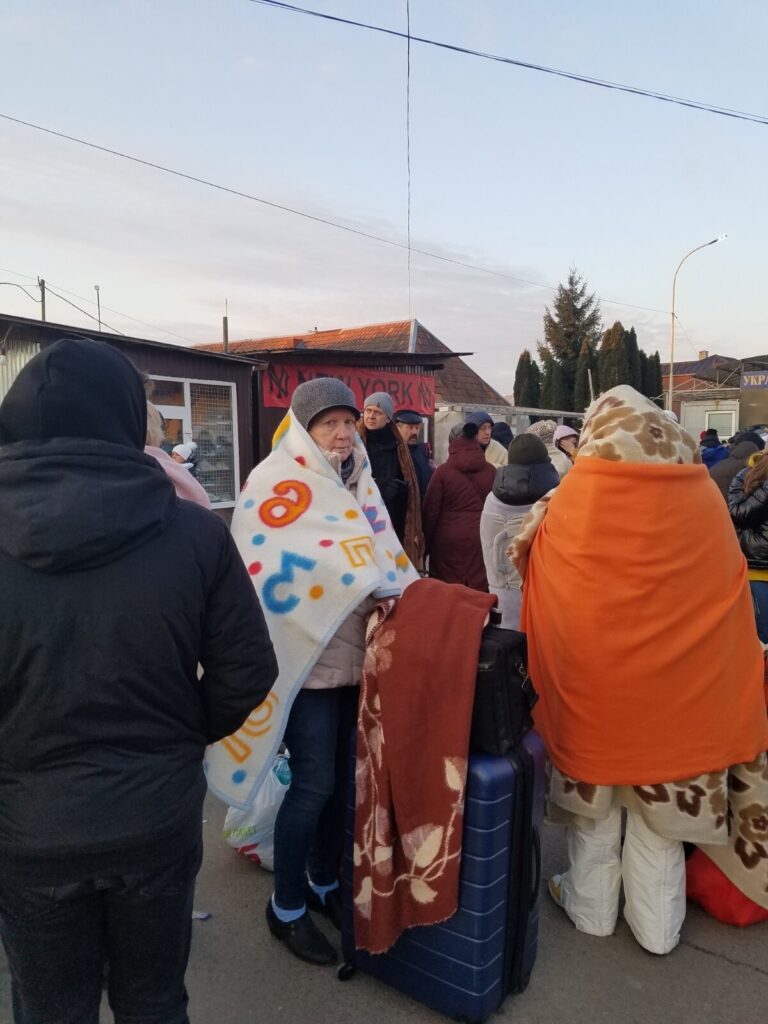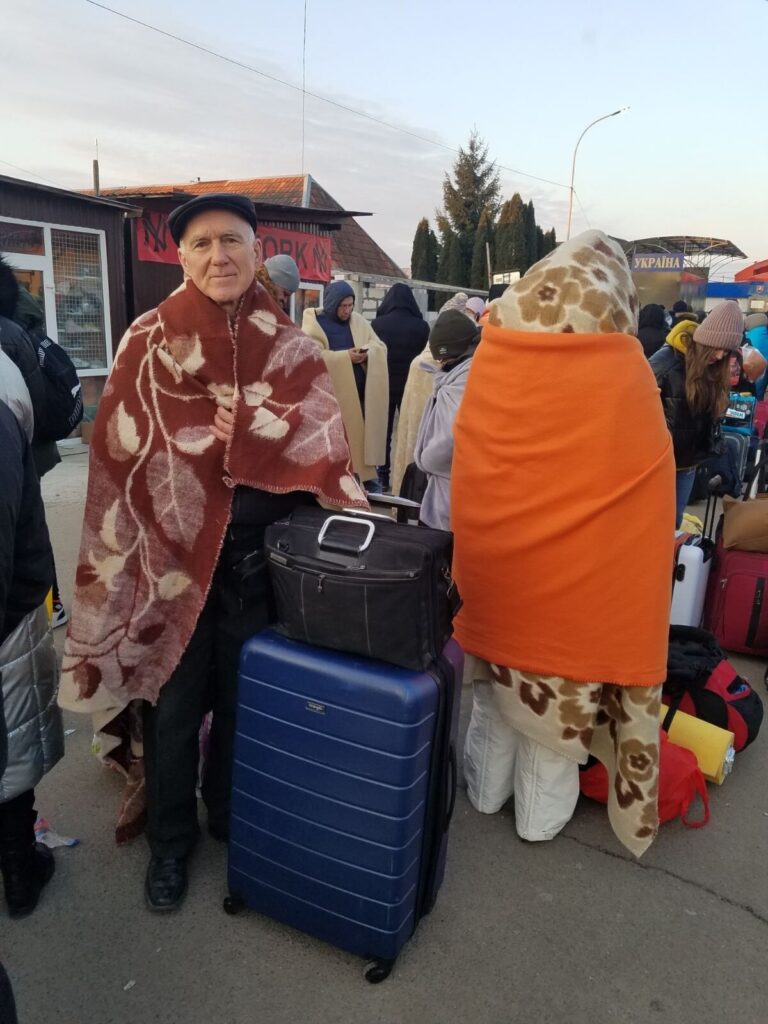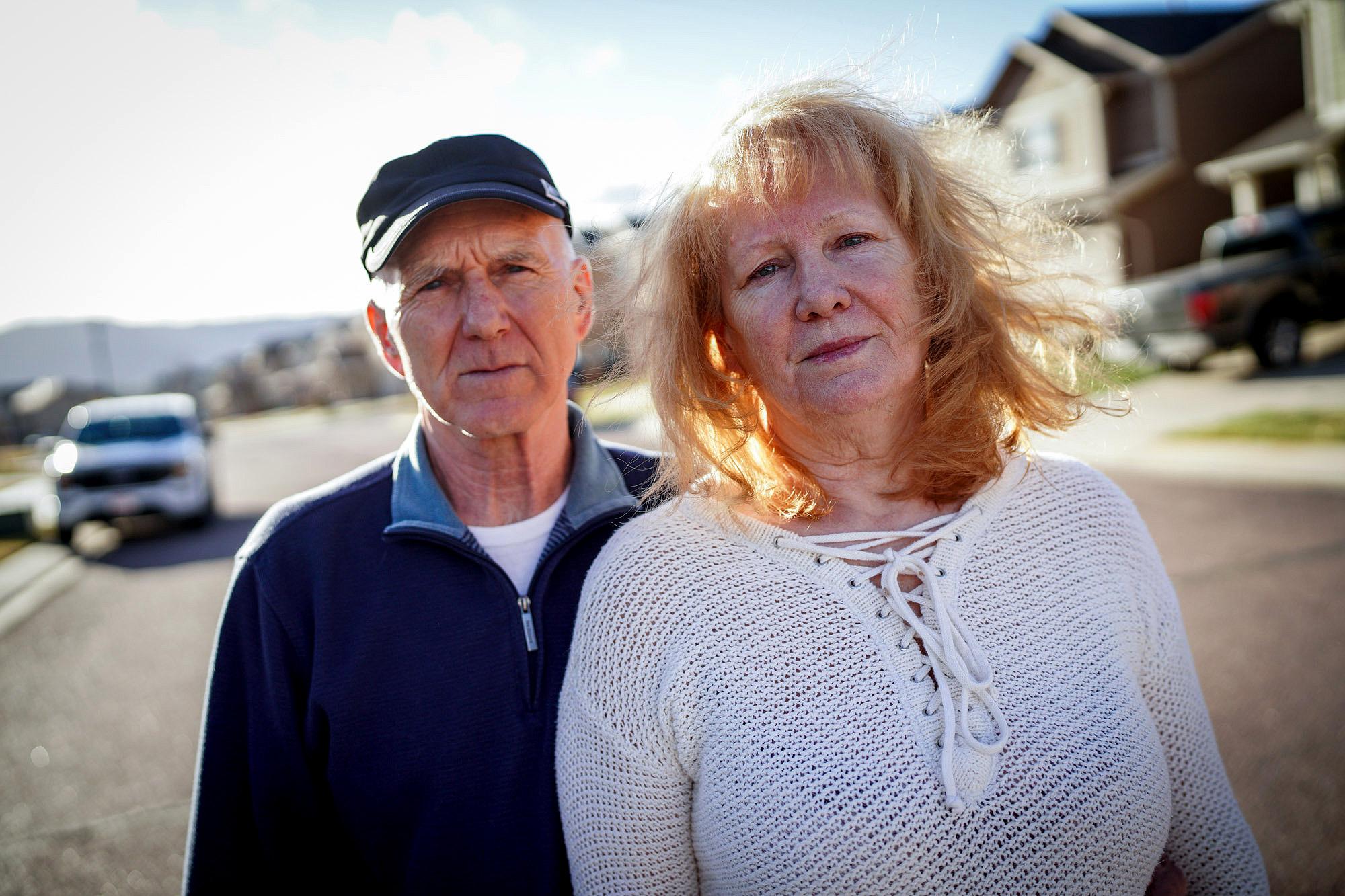
It’s still sinking in for Maryna and Oleksandr that they might never return home to Ukraine.
The couple, who are in their early 60s, fled their apartment in Kyiv after Russia began bombing the city in late February. They traveled for four days by car, train and plane to escape the conflict, finally reaching Colorado on March 1.
Since then, they’ve been living with their daughter and grandchildren in a two-bedroom home in Colorado Springs. Most days, they watch news updates about the invasion and chat with friends and family in Ukraine via social media.
“The war is not going to end soon,” Oleksandr said. “Russia will not let Ukraine go. So we’re hoping to find our home here.”
The couple, who asked to only be identified by first name for safety reasons, is among the first arrivals in what’s expected to be a wave of Ukrainians seeking refuge in Colorado over the coming months. The United Nations estimates more than 4.6 million people have fled the country since war broke out.
Last month, President Joe Biden announced the United States would accept 100,000 Ukrainian refugees over the coming year. Colorado hasn’t released estimates for the number that may end up here, but Gov. Jared Polis and the state’s congressional delegation have promised the state will welcome any refugees fleeing the war.
Maryna and Oleksandr consider themselves lucky to have family in the states. But they’re now struggling to heal from the trauma of fleeing their home while figuring out the logistics of restarting their lives in Colorado.
“There is no clear path for us,” Oleksandr said. “Right now it’s just our family trying to take care of us.”
Both are retired from careers in medicine and government. Neither speaks English; the couple spoke to CPR News through their granddaughter Lydia Miller. And they’ve now lost access to their bank accounts and assets in Ukraine, they said.
Their tourist visas, which they used to get into the country, are only good for several months. They’ve applied for asylum status with the federal government, but haven’t heard back.
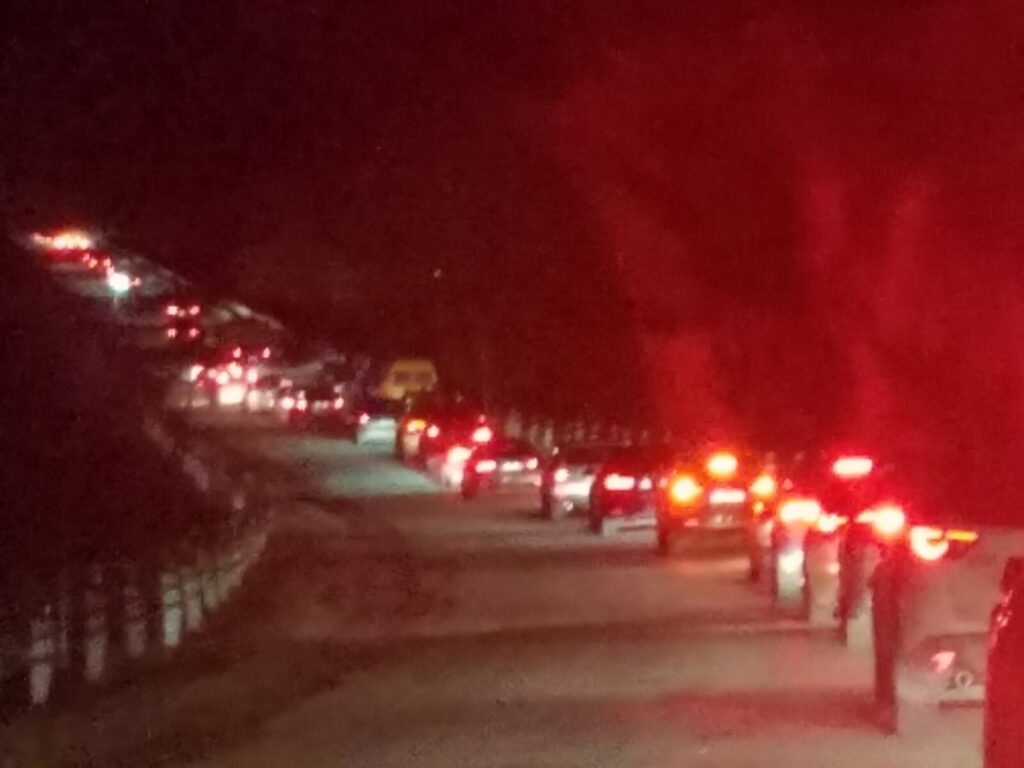
The explosions
Around 5 a.m. on Feb. 24, Maryna woke up to the walls of her downtown Kyiv apartment shaking. She heard what sounded like two bombs going off outside.
She turned to her husband, Oleksandr and woke him up. Half awake, she headed to their guest room, where her daughter and granddaughter were sleeping.
“We thought it was just a random explosion,” she said.
Within 20 minutes, their other daughter in Colorado Springs called. She’d seen on the news that Russia was invading Ukraine.
They decided almost immediately that they needed to leave Kyiv. The family’s apartment was located near an airfield, which they feared could be targeted by Russian airstrikes.
The group grabbed their vital documents, packed suitcases full of clothes and drove to their family’s house in the suburbs of Kyiv. The downtown streets were jammed full of others trying to get out, Oleksandr said. The drive took them half a day.
“It was madness,” Oleksandr said. “Still, we didn’t think it was going to be forever.”
At the suburban home, they watched the news and wondered what to do next. When they woke up the next morning, they felt a similar rumble that they recognized as bombs in the distance.
“We decided it was time to go officially,” Maryna said.
Their first destination was the border between Ukraine and Moldova, where they planned to cross and find a flight that would take them to the United States.
As they drove through the western part of the country, police blockades dotted the roads. Ukrainian military forces had set up stations where Russian bombs had destroyed roads or bridges.
“They were saying you can’t go here or there,” Oleksandr said. “So we had to find a different way.”
Halfway around the world in Colorado Springs, Miller and her family were tracking her grandparents movements via GPS. The family had installed locator apps in the weeks leading up to the invasion for safety reasons, which allowed them to follow along as they fled the country.
“Whenever we would hear something on the news, we would call them and say ‘avoid that city because there are bombings over there,’” Miller said.
At one gas station, the couple waited for 2 hours to fill up. The Ukrainian government had restricted the amount each family could buy to 5 gallons at a time.
“We didn’t stop driving because we were scared we were going to get hit,” Oleksandr said.
The terrified group drove for 24 hours straight.
Crossing the border
Later that day, the couple heard that the international airport in Moldova had shut down for several days due to security concerns. So they headed north, to the border of Slovakia.
The family slept at a friend’s home in a city not too far from where they hoped to cross. The next day, they woke up and drove to the nearest processing station, where they ran into another roadblock.
The line of cars hoping to leave the country was around 10 miles long, according to Oleksandr. The estimated wait was 18 hours.
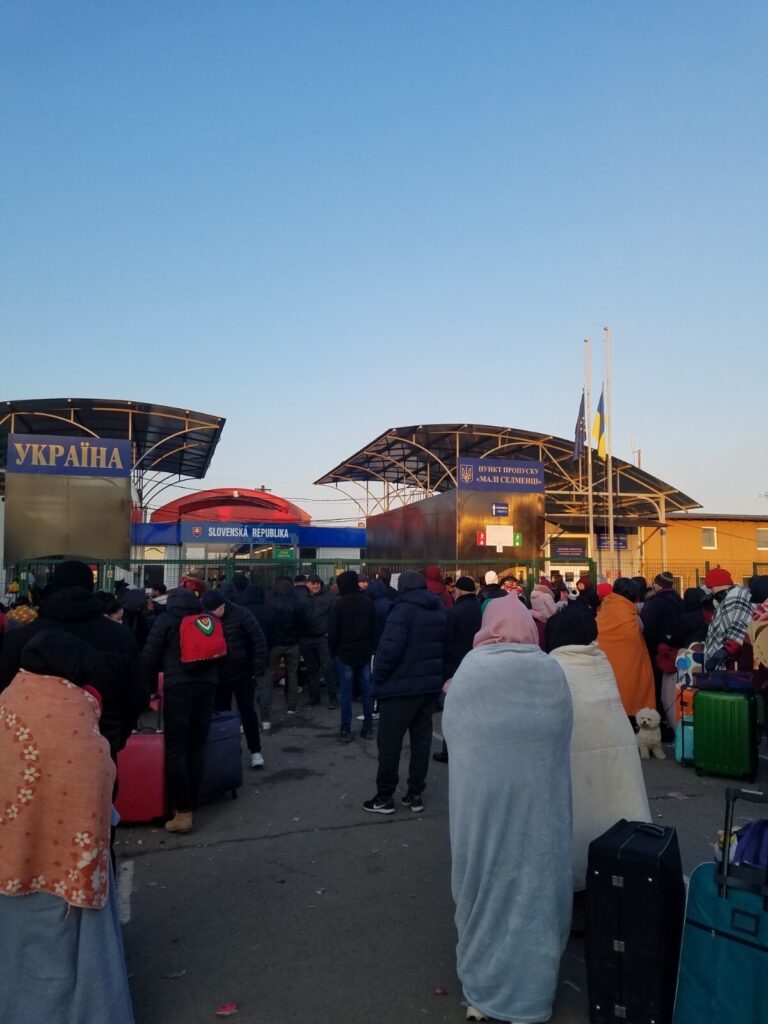
The family ditched that idea and drove 5 miles north to another processing station called Mali Selmentsi, which had a slightly shorter wait estimated to last 12-hours. They parked their car on the side of a road and walked to join a long line of Ukrainians trying to cross the border by foot.
“It was really cold, but the people from Slovakia set up tents along the line of people and were giving out heaters, water, bread, basic foods to everybody who wanted to get across,” Maryna said.
They stood in line from 8 a.m. to 3 p.m., she said. Once they reached the front, a guard checked their IDs to make sure they weren’t males between the ages of 18-60, who are required to stay back and fight in the war.
The group was cleared to cross.
“Actually crossing the border only took 15 minutes,” Oleksandr said.
From there, Slovakian government officials gave them train tickets to the airport in Prague. After spending a day at the airport, they finally flew to Paris. Their daughter and granddaughter split off to stay with a friend in France, they said.
On March 1, their plane landed at Denver International Airport, where their other granddaughter picked them up and drove them to Colorado Springs. When they met at the airport, the family broke down in tears from exhaustion.
“It was sad. We still couldn’t believe there was an actual war happening,” Oleksander said. “When we got to Denver it kind of hit. We couldn’t believe Russia would invade Ukraine because we all speak the same language.”
In Colorado, resettlement questions mount
As Maryna and Oleksandr made their journey, Colorado was preparing for the arrival of many other families with similar stories.
The state’s reaction to Russia's invasion was swift. Within days, demonstrators crowded the state Capitol steps to rally for peace, and Colorado’s congressional delegation unanimously condemned the invasion.
Gov. Jared Polis issued a slew of state-level sanctions against Russia and an executive order directing the state’s refugee and immigrant services programs to prepare for an influx of Ukrainians fleeing the conflict.
“Specifically, our offices will assist by exploring all options for housing, future employment and access to resources,” Polis wrote in a Feb. 25 letter to Secretary of State Antony Blinken. “Colorado stands ready to embrace Ukrainian refugees and urges the (Biden) administration, should this conflict continue, to streamline their ability to find safety and sanctuary.”
Progress has been slow. The State Department paused its operations inside Ukraine at the start of the conflict. Offices in neighboring countries have started processing cases of Ukrainians who fled their home country.
As a result, the U.S. has officially resettled only a dozen Ukrainian refugees since the start of the war, according to Reuters. Colorado has welcomed zero Ukrainians technically classified as refugees, according to the state’s resettlement office.
“The refugee resettlement process can be long and arduous, and many individuals wait for years,” a spokeswoman said. “For instance, it took 24 months for Syrian refugees to arrive in Colorado after the beginning of the Syrian civil war.”
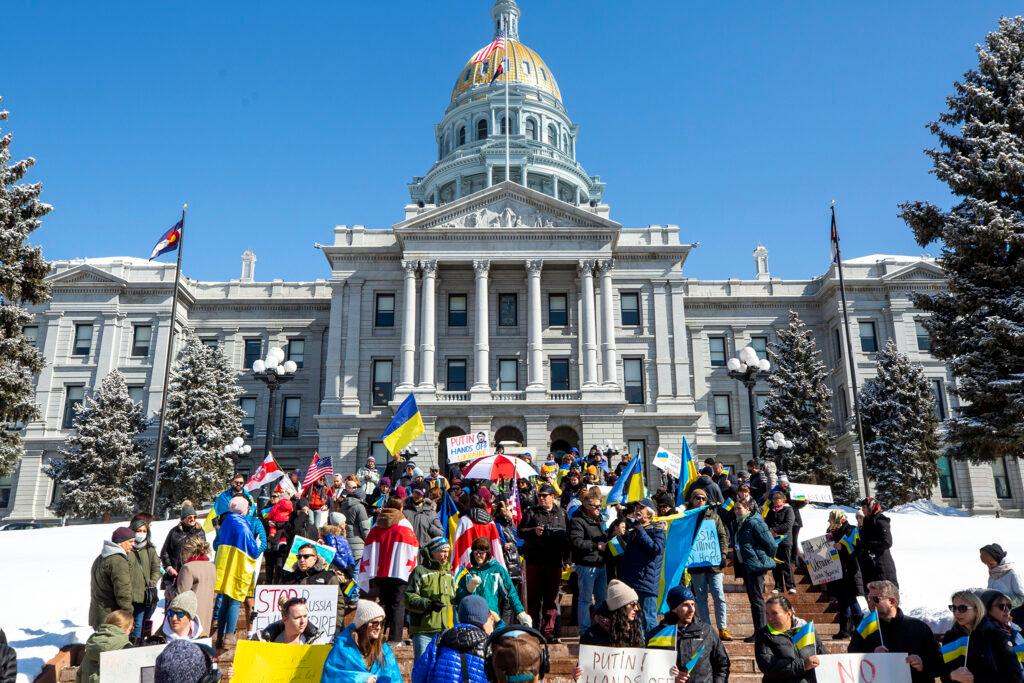
Other options to get access to the United States are limited.
Ukrainians who resided in the United States prior to March 1 can apply for Temporary Protected Status and remain in the country for 18 months, according to new federal rules. The designation could help around 75,000 Ukrainians currently in the U.S. on student, tourist or business visas, according to the Center for Immigration Studies.
Some people, like Maryna and Oleksandr, have been able to fly to the U.S. on tourist visas they got prior to the war and apply for asylum status. Members of Colorado’s congressional delegation have called on the Biden administration to expand and expedite the immigration process for Ukrainians.
Rep. Jason Crow, in a letter sent to Blinken last month, called for the administration to allow all Ukrainians to enter the U.S. as refugees or under humanitarian parole, eliminating student visa wait times and expediting all humanitarian parole applications.
“We believe the U.S. can and should do much more to share responsibility and show solidarity with our EU allies and the Ukrainian people,” Crow wrote. “The Administration has additional immediate tools at its disposal that we ask you to consider using.”
Colorado’s Ukrainian-American population sits at around 11,000, according to state estimates. Many families are looking for faster ways to bring their relatives overseas, but options are still limited for those who don’t already have U.S. tourist visas, said Irina Shatalov, an Aurora resident and organizer with Ukrainians in Colorado. The community group has held fundraisers and demonstrators in the month since the war broke out.
“A lot of people are stuck in Europe,” she said. “They can’t visit their families.”
Even for the few Ukrainians who have arrived on tourist visas to stay with family, government resources are limited.
“They can’t apply for any benefits yet,” Shatalov said. “For those families, it’s a huge, huge problem. There’s no support yet.”
Rep. Diana DeGette recently met with several Ukrainian women who recently arrived in Denver under tourist visas. In the livestreamed meeting, the women recounted their experiences to DeGette and Jennifer Wilson, the director of the International Rescue Commission’s office in Denver.
Wilson and DeGette said Ukrainians who have already arrived in the United States should reach out to their local congressperson’s office to get help expediting their asylum case.
“If people need help, they can call my office,” DeGette said. “People should know they can call us for help.”
Senators Michael Bennet and John Hickenlooper have also set up websites for Ukrainian citizens now living in Colorado to access aid.
Restarting from scratch
For Maryna, Oleksandr and their family, accessing government aid since their arrival has been an uphill battle.
Their granddaughter, Lydia Miller, flew home from Washington D.C. during her college spring break so she could help them.
“I've spent every single day calling nonprofit organizations, calling refugee agencies trying to get help,” Miller said. “The answer that I keep getting is that they don't have citizenship status. So just everyone is saying, they're welcome, but I just would like to see something more tangible than that.”
On March 9, Miller helped her grandparents apply for Temporary Protected Status and asylum. Their TPS application was immediately approved, she said.
Their asylum case is taking longer. Miller, who works as an intern in Sen. John Hickenlooper’s D.C. office, asked colleagues for resources on how to speed up the process.
Hickenlooper’s office helped pass along the request to the Department of Homeland Security, but the process is still likely to take several months because there’s such a large backlog.
“Over 100 people have gone through the process of us trying to help them apply,” Hickenlooper told CPR in an interview. “We’re constantly trying to figure out how to do this better.”
In the meantime, Miller and her grandparents have been focused on finding basic necessities, such as housing and clothes. After hitting roadblocks with local resettlement agencies, Miller set up a GoFundMe to raise money for basic supplies. She posted her grandparents’ story on NextDoor and over a dozen neighbors stopped by to donate clothes, she said.
They’ve also tried having fun together as a family.
“I also took them hiking in the mountains and they absolutely love it,” Miller said. “They want to be professional hikers now.”
The couple says they’re thankful to be safe. They’re now focused on recovering their health after a harrowing 4 day escape.
“Stress affects your health at our age,” Maryna said. “We’re trying to find out if there's a way for refugees that are coming here to get some sort of screening or some basic medicine as they wait for their citizenship status. Because how are we supposed to get better?”
They want to make the most of their retirement like they planned to in Ukraine before the war began.
“We want to start thinking about basic things like getting an apartment, buying a car, learning English,” Oleksandr said. “Right now the asylum and immigration is a waiting game.”
Resources for Ukrainians in Colorado and for those who want to help
Ukrainians of Colorado: The local advocacy group has organized fundraisers, demonstrations and links to housing and immigration resources for Ukrainians who have resettled in the United States.
State of Colorado: The state has put together a FAQ sheet for Ukrainian residents and those who are interested in volunteering with the response.

